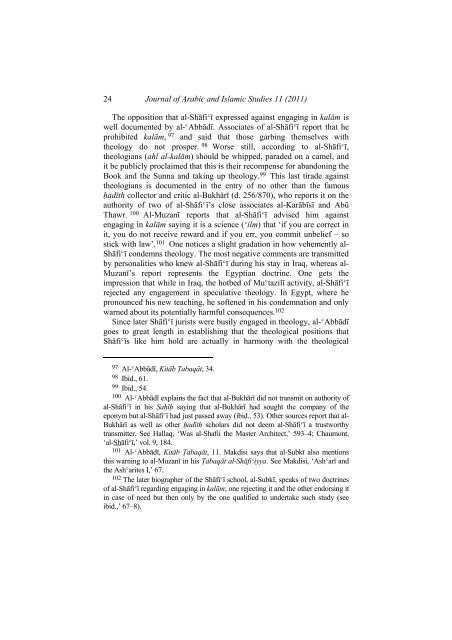JOURNAL OF ARABIC AND ISLAMIC STUDIES
JOURNAL OF ARABIC AND ISLAMIC STUDIES
JOURNAL OF ARABIC AND ISLAMIC STUDIES
You also want an ePaper? Increase the reach of your titles
YUMPU automatically turns print PDFs into web optimized ePapers that Google loves.
24<br />
Journal of Arabic and Islamic Studies 11 (2011)<br />
The opposition that al-Shāfiʿī expressed against engaging in kalām is<br />
well documented by al-ʿAbbādī. Associates of al-Shāfiʿī report that he<br />
prohibited kalām, 97 and said that those garbing themselves with<br />
theology do not prosper. 98 Worse still, according to al-Shāfiʿī,<br />
theologians (ahl al-kalām) should be whipped, paraded on a camel, and<br />
it be publicly proclaimed that this is their recompense for abandoning the<br />
Book and the Sunna and taking up theology. 99 This last tirade against<br />
theologians is documented in the entry of no other than the famous<br />
ḥadīth collector and critic al-Bukhārī (d. 256/870), who reports it on the<br />
authority of two of al-Shāfiʿī’s close associates al-Karābīsī and Abū<br />
Thawr. 100 Al-Muzanī reports that al-Shāfiʿī advised him against<br />
engaging in kalām saying it is a science (ʿilm) that ‘if you are correct in<br />
it, you do not receive reward and if you err, you commit unbelief – so<br />
stick with law’. 101 One notices a slight gradation in how vehemently al-<br />
Shāfiʿī condemns theology. The most negative comments are transmitted<br />
by personalities who knew al-Shāfiʿī during his stay in Iraq, whereas al-<br />
Muzanī’s report represents the Egyptian doctrine. One gets the<br />
impression that while in Iraq, the hotbed of Muʿtazilī activity, al-Shāfiʿī<br />
rejected any engagement in speculative theology. In Egypt, where he<br />
pronounced his new teaching, he softened in his condemnation and only<br />
warned about its potentially harmful consequences. 102<br />
Since later Shāfiʿī jurists were busily engaged in theology, al-ʿAbbādī<br />
goes to great length in establishing that the theological positions that<br />
Shāfiʿīs like him hold are actually in harmony with the theological<br />
97 Al-ʿAbbādī, Kitāb Ṭabaqāt, 34.<br />
98 Ibid., 61.<br />
99 Ibid., 54.<br />
100 Al-ʿAbbādī explains the fact that al-Bukhārī did not transmit on authority of<br />
al-Shāfiʿī in his Ṣaḥīḥ saying that al-Bukhārī had sought the company of the<br />
eponym but al-Shāfiʿī had just passed away (ibid., 53). Other sources report that al-<br />
Bukhārī as well as other ḥadīth scholars did not deem al-Shāfiʿī a trustworthy<br />
transmitter. See Hallaq, ‘Was al-Shafii the Master Architect,’ 593–4; Chaumont,<br />
‘al-Shāfiʿī,’ vol. 9, 184.<br />
101 Al-ʿAbbādī, Kitāb Ṭabaqāt, 11. Makdisi says that al-Subkī also mentions<br />
this warning to al-Muzanī in his Ṭabaqāt al-Shāfiʿiyya. See Makdisi, ‘Ashʿarī and<br />
the Ashʿarites I,’ 67.<br />
102 The later biographer of the Shāfiʿī school, al-Subkī, speaks of two doctrines<br />
of al-Shāfiʿī regarding engaging in kalām; one rejecting it and the other endorsing it<br />
in case of need but then only by the one qualified to undertake such study (see<br />
ibid.,’ 67–8).

















